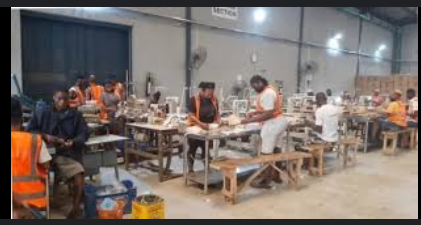Following the National Economic Council’s (NEC) approval of the establishment of a Cotton, Textile and Garment (CTG) Development Board to drive the revitalisation of the country’s textile, investigations have revealed that about 100,000 youths trained on CTG via the Industrial Training Fund (ITF) window in December last year by Adhama Textile Garment Industry based in Kano State are currently not yet gainfully employed in the country’s textile industry, New Telegraph has learnt. Besides, CTG stakeholders have made a bold statement that it is time for President Bola Tinubu to sit down and hold crucial talks with the International Monetary Fund (IMF) to stop the alarming influx of substandard textile fabrics into Nigeria henceforth.
They are also appealing to the Tinubu-led government to make sure that Nigeria’s textile industry controls a minimum of 40 per cent market share in the first three or five years as a way to realise that Nigeria makes a positive impact in the country’s textile industry.
Speaking in an interview with New Telegraph on the composition of the CTG Board established by NEC, Alhaji Saidu Adhama, the Chairman of Adhama Textile Garment Industry Kano, lamented that the country’s CTG industry has been suffering from implementation crisis all this while and this has retrogressively put a setback to the growth in the sector from moving forward.
Adhama while reacting to the 100,000 jobless Nigerian trainees who just completed their CTG training in December 2024, said: “I have said it that 100,000 Nigerians this present administration has so far trained as at last year’s December that is; just some few years ago, are yet to get employment. Who will employ them? We, the Nigerian industries are supposed to employ them.
So, kindly channel that money – Textile Import Levy – being collected by the Nigeria Customs Service (NCS) to us, so that we can engage these trained but idle Nigerian youths. “I was opportune to train over 200,000 CTG workers. Two weeks ago, ITF revisited our industries with the intention to extend the training programmes at our centre.
We are now going to the second level of this training. “How can we continue training these youths without engaging them? And the knowledge to do that is available. So it is only the implementation of these policies that sometimes delays. The implementation should be speedy at this period of establishing the CTG Development Board.”
On boosting the 40 per cent market share of Nigerian textile fabrics, Adhama said: “One of the critical policies we will appeal as a case to the government is to make sure that Nigeria’s textile industry helps control a minimum of 40 per cent market share in the first three or five years. “Whatever we would do to make sure that Nigerian market is for Nigerian industries.
It doesn’t help the government to stop crime. It doesn’t help the government to create peace. It doesn’t help the government if you allow your doors to be open to importing everything. “Surely, we cannot pay people with the conditions to allow everything to be imported into Nigeria.
So, it is time for this reigning government to please and kindly sit down with the IMF on what we can do to reduce importation of substandard textile fabrics.”
On the influx of substandard textile fabrics in the country, the textile merchant noted that “sometimes if you go to Kantin Kwari Clorh market in Kano, you will see ordinary plastic sheet, they called it textile with welder, they called it textile, and people buy it and it affects their health; it affects the health of their skins. Medical doctors always complain.”















